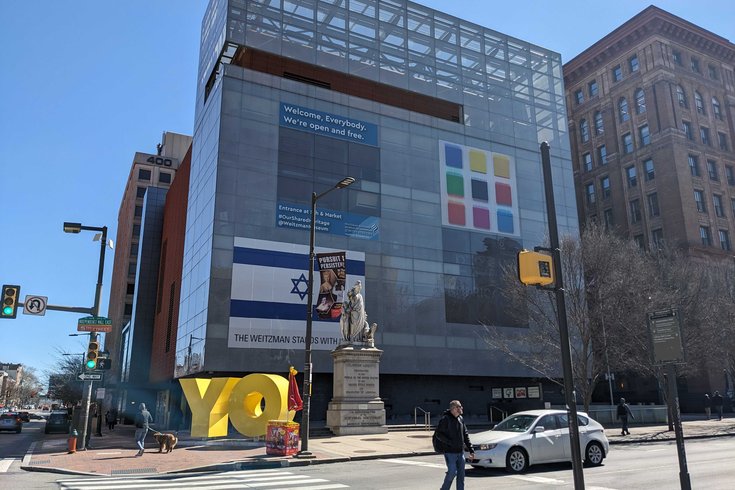
March 21, 2024
 Michaela Althouse/PhillyVoice
Michaela Althouse/PhillyVoice
New legislation in Congress would create a commission to study the possibility of the Weitzman National Museum of American Jewish History in Philadelphia joining the Smithsonian Institution.
A new effort in Congress could lead to the Weitzman National Museum of American Jewish History in Philadelphia becoming part of the Smithsonian — the institution behind many of the museums that line the National Mall in Washington.
A bipartisan act sponsored by Rep. Brendan Boyle (D-Pa.) and Sens. Bob Casey (D-Pa.) and John Fetterman (D-Pa.), among others, would give Congress 90 days to create a commission to examine the transfer of the museum to the Smithsonian. The study could take up to two years.
Emily August, chief public engagement officer at Weitzman, said the process has been underway for a few years, though legislation only was introduced Wednesday. Having bipartisan support in the House and Senate has been crucial, she said.
"What (this act) signifies in terms of recognition is that Jewish people belong in the nation and have made significant contributions to broader American society and culture and that the American story and the Jewish Americans are inextricably linked," August said. "At this time of unprecedented levels of antisemitism and given the White House mandate to broaden appreciation for Jewish American heritage, this just would take that education and those conversations to the next level."
Since the Israeli-Gaza war began in October, the U.S. has seen increases in antisemitism and anti-Palestinian sentiment. Weitzman has said it stands in solidarity with Israel.
The addition of Weitzman to the Smithsonian would expand the museum's access to artifacts, documents, education resources and staff training, according to Boyle. The Weitzman would be the only Smithsonian museum centered on Jewish American culture. It would remain in Philadelphia.
The nine-member commission created by Congress would study the feasibility of the transfer and the transition process. It also would examine potential business models. The commission would file a congressional report detailing the museum's collection, financial assets, liabilities and operating costs. The report also would examine the museum's impact on countering antisemitism and its organizational structure following a transfer.
The commission would include two members appointed by congressional leaders and a non-voting member appointed by Weitzman's board. Its work would be funded by private contributions.
"This powerful institutional integration signals a strong commitment to address the dramatic rise in antisemitism by helping amplify the myriad ways Jewish Americans enriched a nation whose very founding, fittingly, traces back to Philadelphia, the Weitzman Museum's home city," Rep. Debbie Wasserman Schultz (D-Fla.) said in a statement.
August said the possible transfer validates the work of the museum and would expose that work to a broader audience.
"What we are is an education center and we teach the powerful, true, joyful stories of Jewish life in America, how Jews have contributed to America and how, in turn, are grateful for what America has afforded them the opportunity to do," August said. "That (opportunity) just wouldn't have been possible anywhere else in the world. It feels like that work is being validated in a very important way."
There are 21 museums in the Smithsonian network. All but three of them are located in Washington, though one of them is in Chantilly, Virginia, just outside the city. The other two – the American Indian Museum of New York and the Cooper Hewitt – are in New York City. The latter joined the Smithsonian in 1967, though it opened in 1897, according to a spokesperson.
Weitzman officials were unsure how adding the museum to the Smithsonian Institution would impact admission. All Smithsonian museums except Cooper Hewitt are free. The Smithsonian declined to comment on the act.
"It's just a small first step, but it feels like a really big and important one that that is catalyzing the potential inclusion of Jewish stories at the at the national level and that's really, really powerful," August said.